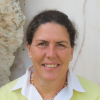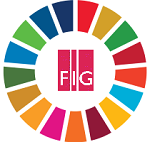News in 2022 
|
FIG and the sustainable Development Goals - Commission 6
March, 2022
FIG Task Force on FIG and the Sustainable Development Goals together
with the ten Commissions have worked on their role on the sustainable
development goals relevant for their Commission.
Commission Chair Maria Joaoh Henriques gives her Statement on the
sustainable development goals in relation to Commission 6 -
Engineering Surveys
|

|
 |
 |
Chair Maria Joao Henriques of Commission 6, Engineering Surveys,
reflects on the contribution of the surveying engineers to the SDGs:
“The high quality achieved by engineering surveyors is the result of the
work of teams with good technical knowledge, with this surveyor acting
prominently in the creation and coordination of these teams. Essential
for the success of these teams is that engineering surveyors transmit
their knowledge to the members of the team, thus improving the overall
quality of the team and of the results. For this reason, engineering
surveyors are already contributing to the goal ‘Quality Education’ (goal
n. º 4). The 5th goal (‘Gender Equality’) must be considered a key goal,
one that must be applied not only by these professionals but by all
specialists in geospatial positioning and society in general. Proper
application of the rules described above will ultimately lead to a
reduction in inequalities and the achievement of goal n. º 10 (‘Reduced
Inequality’).
Besides the general contribution to the goals mentioned above,
also other SDG's are within the scope of the action of Commission 6:
- 6 Clean Water and Sanitation
- 7 Affordable and Clean Energy
- 9 Industry, Innovation and Infrastructure
- 11 Sustainable Cities and Communities
- 13 Climate Action
How do you include the SDG's in your daily work?
As explained, good results in engineering surveying, suitable for the
purpose in view, are dependent on several factors: adequate equipment,
appropriate methodologies and a motivated team with the necessary
skills. These skills come from different sources: they can come from
school education (at different levels) but also from the experience
transmitted by the most knowledgeable co-workers.
Thousands of surveying engineering teams are working in different
parts of the world, many associated with projects that are of vital
importance for the survival and well-being of populations (as examples,
the supply of goods such as water, electricity or sewage systems,
transport infrastructures and buildings such as hospitals or schools) in
the lesser developed countries, small island developing States and
African countries.
This work, and the way it is developed, contributes to many of the
sustainable development goals adopted by United Nations member states.
What are inspiring examples of how FIG members and delegates have
contributed to the achievement of the SDGs (e.g. refer to a paper,
project or publication)?
Concerning equipment, drones are a good example: these are playing a
key role, contributing with vital information where there was none. A
good example is presented in the paper “Unmanned
Aerial Vehicle for Topographical Mapping of Inaccessible Land Areas in
Ghana: A Cost-Effective Approach”.
Of course more examples can be derived from the output of commission
6, either presented at the most important events of the FIG (congresses
and working weeks) or at the specialized symposiums focused on the
themes of this commission as well as on the
homepage of the commission.
What else can FIG do (more) to provide leadership and raise
awareness on the SDG's?
Delegates and all those that follow closely the activity of FIG
should, by now, already be aware of the objectives of the SDG and that
they can contribute to its realization. However, it is true that
globally they seem to be unattainable by 2030. Yet, for purposes of
awareness, it remains important to keep in mind that there are tasks
within each goal and that these can be attainable. At this stage, since
much has been publicized by FIG about the goals, focusing attention only
on some tasks may be simpler and, as mentioned, easier to be achieved.
As a commission we will have support in this process.
Maria Joao Henriques and Paula Dijkstra
March 2022






























